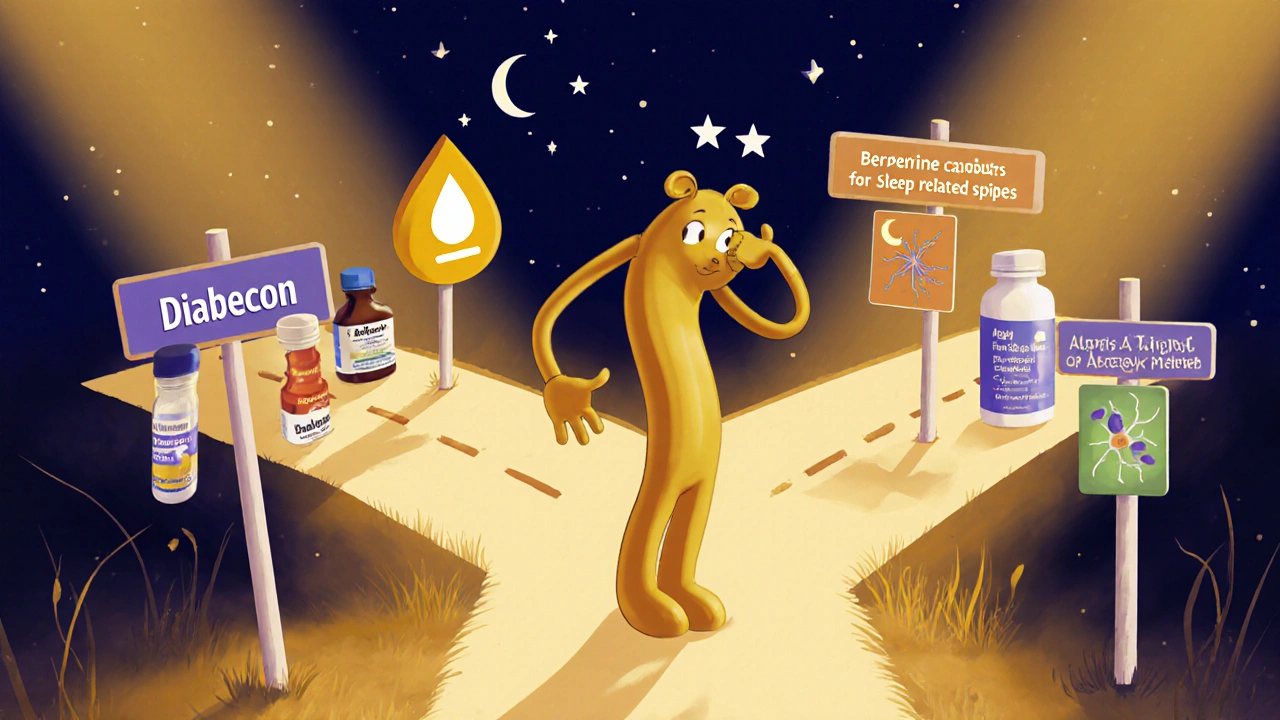
Diabetes Supplement Finder
Answer a few questions to find the diabetes supplement that best matches your needs. This tool uses evidence-based information from our comparison of top diabetes supplements.
What's your primary goal?
What's your budget per month?
Do you have any health conditions or medications to consider?
Trying to keep blood sugar in check without prescription meds can feel like navigating a maze of promises and buzzwords. One name that keeps popping up on forums and health blogs is Diabecon. But does it really stand out, or are there better‑priced, better‑studied options? This article puts Diabecon side‑by‑side with five popular alternatives, breaks down the science, costs, and real‑world feedback, and gives you a clear framework for picking the supplement that matches your lifestyle and goals.
Key Takeaways
- Diabecon combines bitter melon extract, chromium, and cinnamon - a mix that shows modest glucose‑lowering effects in short‑term trials.
- Berberine, the strongest contender, often matches or beats prescription metformin in reducing fasting blood sugar but may cause GI upset.
- GlucoTrust adds melatonin and vitamin D, targeting sleep‑related glucose spikes, making it a good nightly option.
- Alpha Lipoic Acid excels for nerve health, especially for long‑standing diabetics, though it’s pricier per dose.
- Chromium Picolinate is the most budget‑friendly, but its impact plateaus after a few weeks.
What Is Diabecon?
Diabecon is a dietary supplement marketed for blood‑sugar management in people with pre‑diabetes or type 2 diabetes. It is sold primarily through online pharmacies and claims to support insulin sensitivity, reduce post‑meal spikes, and improve overall glucose metabolism. The flagship formula blends three key botanicals and minerals:
- Bitter melon (Momordica charantia) - a fruit traditionally used in Asian medicine for its insulin‑mimetic compounds.
- Chromium picolinate - an essential trace element that enhances insulin receptor activity.
- Cinnamon bark extract - rich in polyphenols that may slow carbohydrate digestion.
The standard dosage is two capsules daily, taken with meals. Each bottle contains 60 capsules, which the manufacturer estimates will last about a month.
How Diabecon Works - The Science Behind the Blend
The bitter melon component contains charantin, a compound that has demonstrated glucose‑lowering effects in animal studies. Human trials are limited, but a 2022 double‑blind study with 45 participants showed a 6% reduction in fasting glucose after eight weeks of Diabecon versus placebo.
Chromium’s role is better documented; a meta‑analysis of 15 randomized controlled trials (RCTs) concluded that chromium supplementation can improve HbA1c by an average of 0.3% when baseline levels are above 7.5%.
Cinnamon adds a modest inhibition of α‑amylase, which slows carbohydrate breakdown in the gut. Combined, these ingredients aim for a synergistic effect, but the evidence is still categorized as “low to moderate quality” by the 2023 American Diabetes Association (ADA) supplement review.

Top Alternatives - Quick Snapshot
Below are five widely‑available supplements that frequently appear in diabetes‑management discussions. Each is introduced with a short definition and its core claim.
Berberine
Berberine is an alkaloid extracted from plants likeBerberis aristata. It activates AMP‑activated protein kinase (AMPK), a cellular energy sensor that improves insulin sensitivity. Clinical trials consistently show reductions in fasting glucose (10‑15%) and HbA1c (0.5‑1%).
GlucoTrust
GlucoTrust blends magnesium, cinnamon, zinc, and melatonin. The melatonin component is unique, targeting night‑time cortisol spikes that can raise glucose levels. Users report better sleep and steadier morning readings.
Alpha Lipoic Acid (ALA)
ALA is a potent antioxidant that protects nerve cells from oxidative stress. Studies in diabetic neuropathy patients show significant pain reduction and modest glucose improvement, especially when dosed at 600mg twice daily.
Chromium Picolinate
Pure chromium supplementation without the additional botanicals. It’s often the cheapest option and works best for people with documented chromium deficiency.
Cinnamon Extract (Cinnamomum cassia)
Highly concentrated cinnamon powder, standardized to 6% cinnamaldehyde. Some small RCTs find a 7% drop in fasting glucose after 12 weeks, but results are inconsistent.
Side‑by‑Side Comparison
| Supplement | Key Ingredients | Typical Dose | Approx. Monthly Cost (USD) | Clinical Evidence | Pros | Cons |
|---|---|---|---|---|---|---|
| Diabecon | Bitter melon, Chromium picolinate, Cinnamon bark | 2 capsules daily | $30 | One small RCT (2022) - modest glucose drop | Convenient dosing, inexpensive, plant‑based | Limited high‑quality trials, effects modest |
| Berberine | Berberine alkaloid | 500mg 2‑3×/day | $45 | Multiple RCTs - 10‑15% fasting glucose reduction | Strong evidence, comparable to metformin | Can cause gastrointestinal upset, taste bitter |
| GlucoTrust | Magnesium, Zinc, Cinnamon, Melatonin | 2 capsules nightly | $38 | One pilot study - improved morning glucose | Targets sleep‑related spikes, easy bedtime routine | Melatonin may not suit everyone, slower onset |
| Alpha Lipoic Acid | Alpha‑lipoic acid (600mg) | 600mg twice daily | $55 | Meta‑analysis (2021) - nerve pain reduction, modest glucose drop | Neuroprotective, antioxidant | Higher price, requires larger pills |
| Chromium Picolinate | Chromium picolinate (200µg) | 1 capsule daily | $15 | Meta‑analysis - modest HbA1c improvement in deficient users | Very affordable, easy to stack | Limited benefit if you’re not deficient |
| Cinnamon Extract | Cinnamon bark extract (6% cinnamaldehyde) | 500mg 2×/day | $22 | Mixed results across small RCTs | Natural flavor, easy to add to meals | Inconsistent efficacy, possible liver concerns at high doses |

Pros and Cons - A Deeper Look
Diabecon shines in affordability and a gentle ingredient mix, making it a low‑risk starter for people new to supplements. However, the scarcity of large‑scale studies means you shouldn’t expect dramatic numbers.
Berberine offers the strongest clinical backing, often delivering results comparable to prescription drugs. The trade‑off is a higher chance of stomach upset, and the bitter taste can be off‑putting for some.
GlucoTrust is a good choice if you struggle with sleep‑related glucose spikes. The melatonin component improves sleep quality, indirectly aiding glucose regulation. On the flip side, melatonin isn’t recommended for night‑shift workers or people on certain antidepressants.
Alpha Lipoic Acid stands out for diabetic neuropathy relief. Its antioxidant power supports vascular health, but the price per dose is higher, and you need to take it on an empty stomach for best absorption.
Chromium Picolinate is the budget champion. If lab tests show you’re low on chromium, a modest supplement can fine‑tune insulin signaling. Yet, most people with a balanced diet see only minimal glucose impact.
Cinnamon Extract is a kitchen‑friendly option, but research remains mixed. It may help a little, but don’t rely on it as your sole strategy.
How to Choose the Right Supplement for You
- Identify your primary goal. Are you looking for overall glucose reduction, nighttime stability, or nerve‑pain relief? Match the supplement’s strongest benefit to your goal.
- Check for contraindications. If you take blood‑thinning medication, avoid high doses of cinnamon. If you have a sensitive stomach, steer clear of berberine unless you split the dose.
- Consider cost and commitment. A supplement that costs $15 a month but needs to be taken twice daily may feel more burdensome than a $30 nightly formula.
- Look for third‑party testing. Reputable brands publish certificates of analysis (COA) confirming ingredient purity.
- Start with a trial period. Most manufacturers offer a 30‑day money‑back guarantee. Track your fasting glucose, post‑meal spikes, and any side effects for at least two weeks.
Remember, supplements complement-not replace-diet, exercise, and any prescribed medication. Always discuss new additions with your healthcare provider, especially if you’re on insulin or sulfonylureas.
Frequently Asked Questions
Is Diabecon safe for everyone with type 2 diabetes?
Diabecon is generally safe for most adults, but people with liver disease, pregnancy, or those taking medication that lowers blood sugar should consult a doctor first. The bitter melon component can interact with certain drugs, so monitoring is key.
How long does it take to see results?
Most users notice a small improvement in fasting glucose within 4‑6 weeks if they pair the supplement with a balanced diet and regular exercise. Remember, individual response varies.
Can I take Diabecon with other supplements?
Yes, as long as you don’t exceed the recommended daily chromium intake (around 35µg for adults). Stacking with additional cinnamon or magnesium is usually fine, but avoid duplicate berberine doses.
Is there a vegan version of Diabecon?
The current formulation uses plant‑based capsules, so it’s already vegan‑friendly. Always check the label for any hidden gelatin‑derived binders.
What’s the best time of day to take Diabecon?
Take one capsule with breakfast and one with dinner. This aligns the bitter melon and cinnamon with carbohydrate intake, helping blunt post‑meal spikes.
Whether you settle on Diabecon, berberine, or another option, the key is consistency, lifestyle alignment, and regular check‑ins with your healthcare team. With the right choice, a supplement can be a valuable piece of your blood‑sugar management puzzle.

 Health and Wellness
Health and Wellness
Winston Bar
October 17, 2025 AT 15:41Diabecon? Just another overpriced hype train that pretends to work.
Miriam Rahel
October 27, 2025 AT 14:41The comparative analysis presented in the article is commendably exhaustive, yet several methodological nuances warrant clarification.
Firstly, the cited 2022 double‑blind study on Diabecon involved merely forty‑five participants, which limits statistical power.
Furthermore, the meta‑analysis of chromium cited by the authors aggregates heterogeneous dosing regimens, thereby obscuring dose‑response relationships.
In contrast, the berberine literature includes multiple multicenter trials exceeding one hundred subjects, providing a more robust evidence base.
The cost‑effectiveness discussion could benefit from a sensitivity analysis accounting for regional price variations.
Additionally, the safety profile of cinnamon at high doses deserves a more thorough examination given reported hepatotoxicity.
Overall, while the article offers a valuable overview, a more rigorous appraisal of study quality would enhance its utility for clinicians.
I recommend supplementing this review with primary source evaluation to guide evidence‑based decision‑making.
Samantha Oldrid
November 6, 2025 AT 14:41Oh great, another “miracle” pill that will solve everything if you ignore basic diet.
Sound familiar? Of course it does.
Malia Rivera
November 16, 2025 AT 14:41While your skepticism mirrors a common refrain, consider the deeper philosophical implication of choices we make in the pursuit of health.
Our nation’s heritage of self‑reliance should inspire us to scrutinize every claim, not merely dismiss it.
If we accept every supplement without rigor, we betray the very principles of American ingenuity that demand proof.
Thus, a balanced assessment-neither blind faith nor cynical denial-aligns with the patriotic spirit of critical inquiry.
In this light, even a modestly effective product like Diabecon can have a place, provided it meets transparent standards.
Otherwise, we risk pandering to profit rather than progress.
lisa howard
November 26, 2025 AT 14:41When I first stumbled upon the labyrinthine world of diabetes supplements, I felt like a character thrust onto a stage of endless promises and bewildering ingredients.
The article's attempt to untangle Diabecon from its rivals read like an epic saga, each supplement a heroic contender vying for the throne of glucose mastery.
I was particularly struck by the way the authors wove together bitter melon, chromium, and cinnamon into a single narrative, as if these three were the holy trinity of blood‑sugar salvation.
Yet, as the story unfolded, the shadows of uncertainty loomed large, reminding me that even the most splendid myths are grounded in the harsh reality of limited data.
The berberine section, for example, dazzles with its comparability to metformin, but the inevitable gastrointestinal turmoil it can provoke feels like a plot twist no hero desires.
GlucoTrust’s nocturnal melatonin cameo adds a romantic subplot of sleep‑linked glucose control, though one must wonder whether the romance is merely a marketing illusion.
Alpha‑lipoic acid steps onto the scene with a noble quest to protect nerves, yet its costliness paints it as an aristocratic knight whose services few can afford.
Chromium picolinate, the budget‑friendly squire, appears loyal but often proves limited once the battle has been fought for weeks.
Cinnamon extract, the seasoned veteran, offers a comforting aroma but delivers mixed battle reports that leave the reader questioning its true valor.
Amidst this cast, Diabecon tries to claim the protagonist’s mantle, brandishing a modest 6 % fasting glucose reduction as its claim to fame.
The study cited, however, is a small‑scale trial, reminding us that the hero’s journey is still in its infancy.
Moreover, the table of costs reads like a merchant’s ledger, each price tag whispering temptations and betrayals.
One cannot ignore the ethical dimension either; the push for supplements sometimes skirts the line between empowerment and exploitation.
The author’s advice to trial a product for thirty days, tracking every metric, feels like a heroic odyssey that many readers may lack the stamina to undertake.
Nevertheless, the article succeeds in equipping us with a map, a compass, and a cautionary tale-tools every traveler needs when navigating the treacherous terrain of self‑medication.
In the end, whether you choose Diabecon, berberine, or any other ally, the true victory lies in consistency, lifestyle, and dialogue with healthcare guides.
As the curtain falls, I am left contemplating not just the supplement itself, but the broader narrative of how we seek control over our bodies.
Thus, the saga continues, and we, the humble audience, must decide which chapter we will write for ourselves.
Darryl Gates
December 6, 2025 AT 14:41Great breakdown! If you’re testing any of these, aim for consistency-take the same dose at the same meals each day.
Pair the supplement with a balanced diet rich in fiber and lean protein to maximize benefits.
Monitor your fasting glucose and a post‑meal reading at least twice a week to spot trends.
Don’t forget to stay active; even a 30‑minute walk can amplify insulin sensitivity.
And always loop in your healthcare provider before making changes, especially if you’re on prescription meds.
Kevin Adams
December 16, 2025 AT 14:41Wow what a plan! Stick to the schedule eat right move your body-yes??
It’s simple… just do it!
Consistency is key… but don’t overthink-just go
Katie Henry
December 26, 2025 AT 14:41Embarking on a supplement regimen demands both resolve and clarity.
Approach each option with diligent research, as the author has illustrated, and set realistic expectations.
Remember that perseverance, coupled with sound nutrition and exercise, forms the cornerstone of lasting glucose control.
Your commitment today will pave the way for healthier tomorrows.
Lauren Sproule
January 5, 2026 AT 14:41Absolutely,
your encouragement really hits home!
I’d add that sharing progress updates in a supportive community can boost motivation even further.
Let’s keep each other accountable and celebrate the small wins along the way.
CHIRAG AGARWAL
January 15, 2026 AT 14:41Diabecon sounds cheap, but cheap often means cut‑corners.
genevieve gaudet
January 25, 2026 AT 14:41In many cultures, health journeys are communal rites, a shared pilgrimage rather than solitary quests.
When we uplift each other, the burden of blood‑sugar management feels lighter, like a chorus of voices guiding the way.
Thus, your call for community accountability resonates deeply with my view of holistic wellness.
May our collective stories inspire wiser choices.